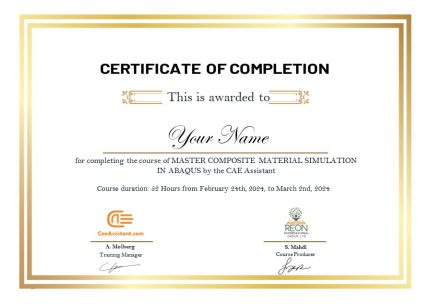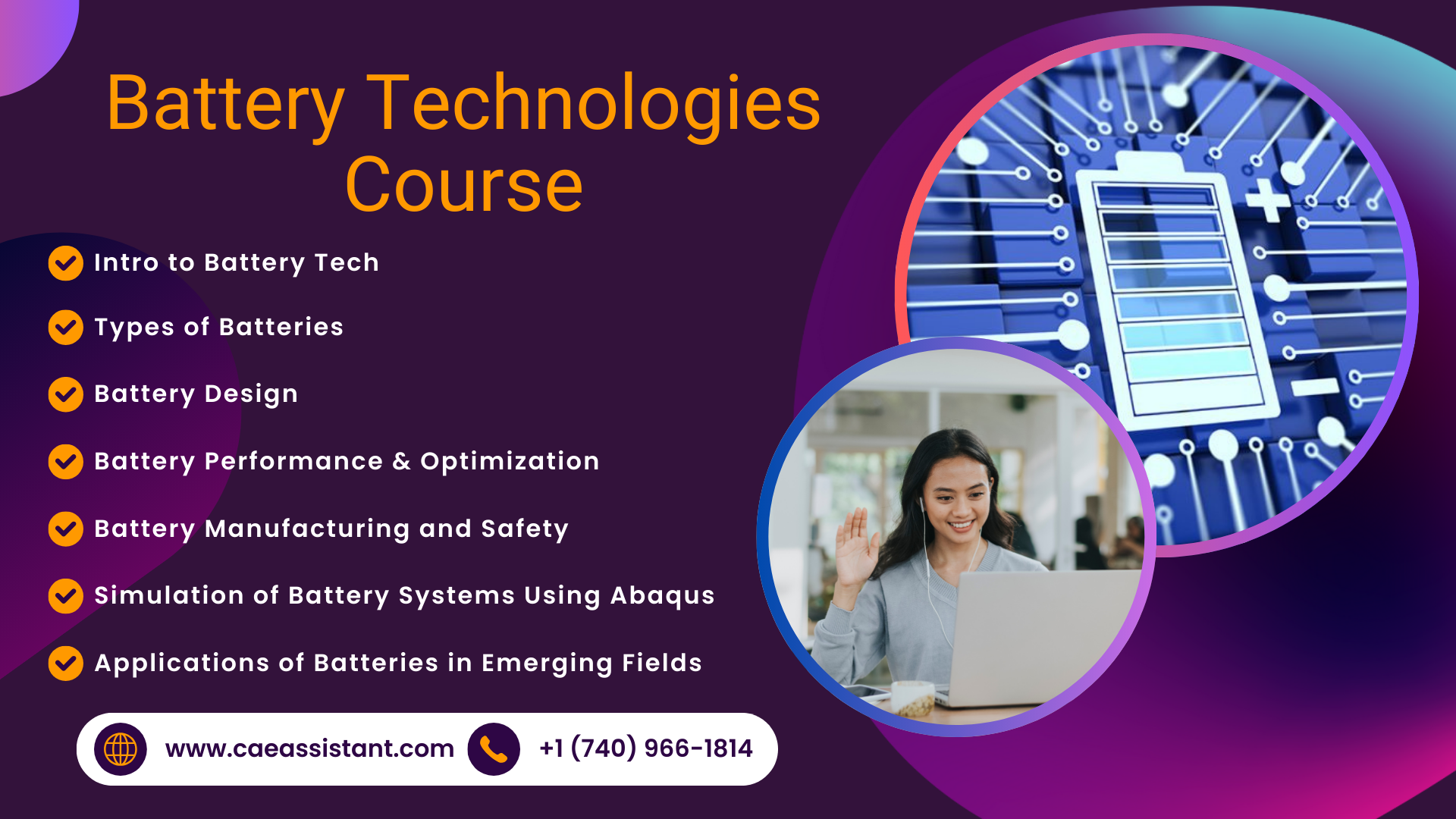Battery Technologies Course
Battery Technologies Course Overview
The Battery Technologies Course provides an in-depth exploration of the science, engineering, and applications of modern battery systems. The course is structured into eight modules covering everything from battery chemistry and performance to cutting-edge simulations using Abaqus. Students will gain hands-on experience, analyze real-world case studies, and apply their learning in industry-relevant contexts such as electric vehicles, renewable energy storage, and smart cities.
The course is designed to equip learners with the skills and knowledge required to excel in the rapidly evolving battery technology industry.
Battery Technologies Course Objectives
By the end of the battery technologies course, students will:
- Understand the fundamentals of battery technologies, including electrochemistry, design, and manufacturing.
- Analyze the performance of various battery types, focusing on energy density, lifespan, and thermal management.
- Apply simulation techniques to optimize battery performance using software such as Abaqus.
- Explore emerging technologies in batteries and their applications in industries like electric vehicles and renewable energy.
- Develop practical skills through hands-on projects and case studies that reflect real-world challenges.
- Understand the sustainability challenges associated with battery production and disposal, and learn about innovative recycling techniques.
Key Features of the Course
- Hands-on Projects: Develop models and simulate real-world scenarios as part of the battery technologies course.
- Industry-Focused Case Studies: Examine implementations in manufacturing, electric cars, and other devices, providing practical insights into battery innovations.
- Expert Lectures: Learn from industry leaders and experienced professionals through our comprehensive battery technologies course.
- Collaborative Learning: Access to a virtual platform for networking and peer discussions, enhancing your understanding of battery technologies.
- Capstone Project: Apply what you’ve learned with a real-world project, from conceptual design to deployment, ensuring a complete mastery of battery technologies.
Course Outcomes
Upon successful completion of the battery technologies course, participants will be able to:
- Identify and differentiate between various battery chemistries and their applications.
- Simulate battery systems using advanced software tools to predict performance and identify optimization opportunities.
- Evaluate battery performance in real-world scenarios using performance metrics such as cycle life, state of charge, and energy efficiency.
- Apply sustainability principles to the design, manufacturing, and recycling of batteries.
- Design and implement battery management systems (BMS) to enhance safety, performance, and longevity.
- Develop and simulate models for batteries, enabling real-time monitoring and performance prediction.
Course Assessment
Students will be assessed through a combination of:
- Quizzes and Tests after each module to ensure understanding of core concepts.
- Simulation Projects where students will apply their learning in hands-on tasks using Abaqus.
- Case Study Analyses, focusing on real-world applications of battery technology in sectors like electric vehicles and renewable energy.
- Capstone Project, where students will conceptualize, design, and simulate a battery system in a real-world context.
- Peer Evaluations in group-based projects and discussions to foster collaborative learning.
- Overview: This module will introduce the basic principles of battery technology, exploring their applications, types, and importance in modern systems.
- Topics Covered:
- History and evolution of batteries
- Basic principles of how batteries work
- Importance and applications in electric vehicles (EVs), renewable energy systems, consumer electronics, and other industries
- Current trends in battery technology and future outlook
- Topics Covered:
- Overview: A detailed examination of the different types of batteries, their chemistry, structure, and applications.
- Topics Covered:
- Lead-acid, nickel-cadmium (NiCd), nickel-metal hydride (NiMH), lithium-ion, and other types of batteries
- Chemical reactions in various types of batteries
- Advantages, disadvantages, and applications of each type
- Battery chemistry and performance
- Topics Covered:
- Overview: Understanding the chemistry behind battery operation and the design of different battery components.
- Topics Covered:
- Basics of electrochemistry: electrode potentials, cell voltage, Faraday’s laws of electrolysis
- Anatomy of a battery: electrodes, electrolytes, separators, casing, and packaging
- Battery design, including cylindrical, prismatic, and pouch cells
- Topics Covered:
- Overview: Evaluation of the key performance metrics of batteries and strategies to optimize their usage.
- Topics Covered:
- Measuring energy density, cycle life, efficiency, and state of charge (SOC)
- Impact of temperature, charge/discharge speed, and electrode materials on performance
- Losses during charging and discharging, and their impact on battery life
- Battery management systems (BMS), cell balancing, and state of health (SOH) estimation
- Topics Covered:
- Overview: Exploring the processes involved in the manufacturing of batteries and addressing safety concerns.
- Topics Covered:
- Battery manufacturing processes, including slurry preparation, coating, drying, and calendering
- Types of cell geometries: button cells, cylindrical cells, prismatic cells
- Safety features and thermal runaway prevention in lithium-ion batteries
- Topics Covered:
- Overview: This module focuses on cell-level multiscale, multiphysics analysis of battery performance using the Abaqus software.
- Topics Covered:
- Simulation of electrochemical performance based on porous electrode theory
- Modeling thermal effects from ionic diffusion, electrical conduction, and entropy change
- Mechanical effects due to lithiation-induced swelling
- Coupling between electrochemical, thermal, and mechanical processes
- Topics Covered:
- Overview: Delving into how batteries are revolutionizing various industries and their role in future energy solutions.
- Topics Covered:
- Batteries in electric vehicles
- Batteries in renewable energy systems
- Large-scale energy storage systems and residential battery sizing
- New battery innovations, such as lithium-sulfur, lithium-oxygen, and redox-flow batteries
- Topics Covered:
- Overview: Examining the environmental impact of batteries and forecasting future trends in battery technology.
- Topics Covered:
- Environmental concerns related to battery production, usage, and disposal
- Recycling and material recovery processes
- Next-generation battery technologies and challenges
- Future research directions and emerging battery materials
- Topics Covered:
Our team of CAE Assistant instructors, renowned experts in their respective domains, will deliver each section of the course, providing you with unparalleled knowledge and insights.
Currently, the course instructor is being finalized, but we are committed to bringing you one of the leading experts in the field. We’re working diligently to ensure that a top researcher will be selected to develop and deliver this course soon.
The battery technologies course is ideal for:
- Engineers and Scientists who are looking to deepen their knowledge of battery technology and its applications in modern industries.
- Students and Researchers interested in electrochemistry, energy storage systems, and material science.
- Industry Professionals working in electric vehicles, renewable energy, or smart grid technologies who want to improve their expertise in battery systems.
- Academicians and Educators who wish to teach or specialize in battery technology at an advanced level.
Finite Element Analysis course Certificate
Upon successful completion of this course, you will receive a course completion certificate. This certificate guarantees your skills with the amount of time spent, skills trained, and can be verified online.

Completing the Battery Technologies course can lead to several exciting job opportunities in the rapidly growing energy sector. Here are the key roles:
- Battery Engineer
Design, develop, and test battery systems for various applications, including electric vehicles and energy storage, optimizing performance and efficiency. - Battery Simulation Engineer
Use advanced software like Abaqus to simulate and predict battery behavior, helping to improve energy density, lifespan, and thermal management. - Battery Management System (BMS) Engineer
Develop and implement BMS to monitor and enhance battery safety, performance, and longevity across various industries. - Energy Storage Systems Engineer
Design and manage large-scale battery storage systems, particularly for renewable energy solutions like solar and wind power integration. - Sustainability and Recycling Specialist
Focus on the sustainability of battery technologies, improving recycling processes and addressing environmental challenges in battery production and disposal.
First Session for Free!



